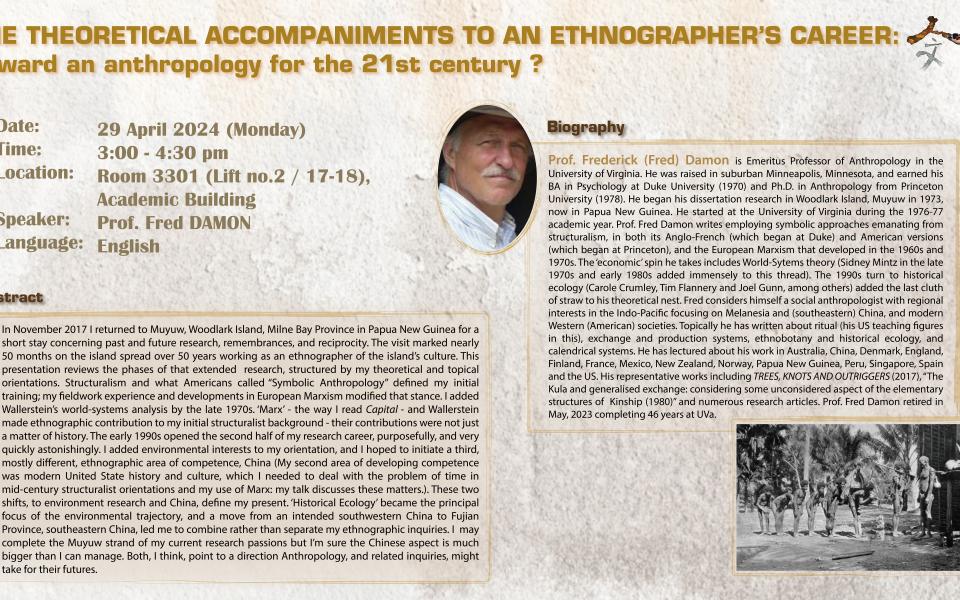Abstract:
In November 2017 I returned to Muyuw, Woodlark Island, Milne Bay Province in Papua New Guinea for a short stay concerning past and future research, remembrances, and reciprocity. The visit marked nearly 50 months on the island spread over 50 years working as an ethnographer of the island’s culture. This presentation reviews the phases of that extended research, structured by my theoretical and topical orientations. Structuralism and what Americans called “Symbolic Anthropology” defined my initial training; my fieldwork experience and developments in European Marxism modified that stance. I added Wallerstein’s world-systems analysis by the late 1970s. ‘Marx’—the way I read Capital—and Wallerstein made ethnographic contribution to my initial structuralist background —their contributions were not just a matter of history. The early 1990s opened the second half of my research career, purposefully, and very quickly astonishingly. I added environmental interests to my orientation, and I hoped to initiate a third, mostly different, ethnographic area of competence, China (My second area of developing competence was modern United States history and culture, which I needed to deal with the problem of time in mid-century structuralist orientations and my use of Marx: my talk discusses these matters.). These two shifts, to environmental research and China, define my present. ‘Historical Ecology’ became the principal focus of the environmental trajectory, and a move from an intended southwestern China to Fujian Province, southeastern China, led me to combine rather than separate my ethnographic inquiries. I may complete the Muyuw strand of my current research passions but I’m sure the Chinese aspect is much bigger than I can manage. Both, I think, point to a direction Anthropology, and related inquiries, might take for their futures.
Biography:
Prof. Frederick (Fred) Damon is Emeritus Professor of Anthropology in the University of Virginia. He was raised in suburban Minneapolis, Minnesota, and earned his BA in Psychology at Duke University (1970) and Ph.D. in Anthropology from Princeton University (1978). He began his dissertation research in Woodlark Island, Muyuw in 1973, now in Papua New Guinea. He started at the University of Virginia during the 1976-77 academic year. Prof. Fred Damon writes employing symbolic approaches emanating from structuralism, in both its Anglo-French (which began at Duke) and American versions (which began at Princeton), and the European Marxism that developed in the 1960s and 1970s. The ‘economic’ spin he takes includes World-Systems theory (Sidney Mintz in the late 1970s and early 1980s added immensely to this thread). The 1990s turn to historical ecology (Carole Crumley, Tim Flannery and Joel Gunn, among others) added the last clutch of straw to his theoretical nest. Fred considers himself a social anthropologist with regional interests in the Indo-Pacific focusing on Melanesia and (southeastern) China, and modern Western (American) societies. Topically he has written about ritual (his US teaching figures in this), exchange and production systems, ethnobotany and historical ecology, and calendrical systems. He has lectured about his work in Australia, China, Denmark, England, Finland, France, Mexico, New Zealand, Norway, Papua New Guinea, Peru, Singapore, Spain and the US. His representative works including TREES, KNOTS AND OUTRIGGERS (2017), “The Kula and generalised exchange: considering some unconsidered aspect of the elementary structures of Kinship (1980)” and numerous research articles. Prof. Fred Damon retired in May, 2023 completing 46 years at UVa.
